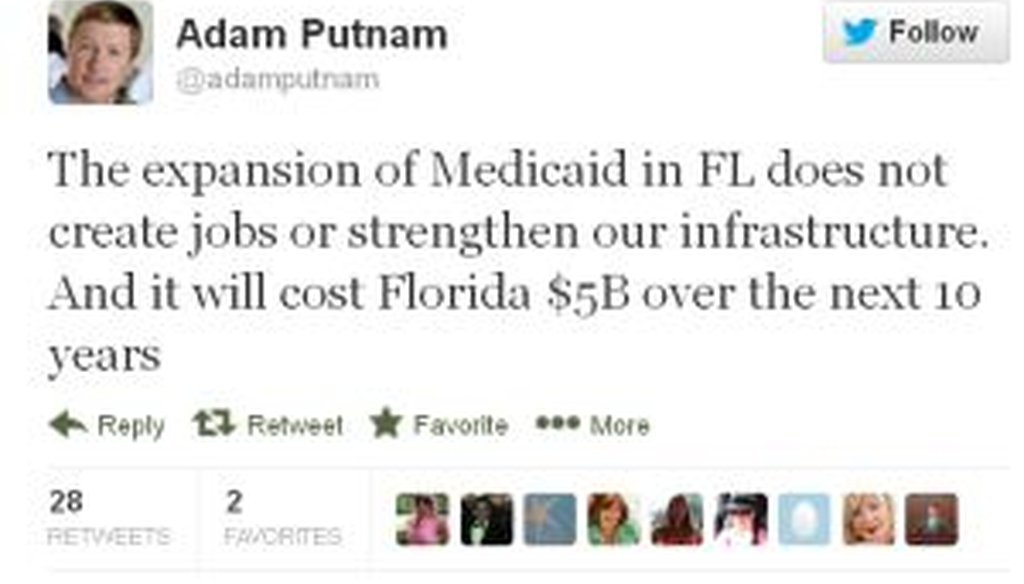Get PolitiFact in your inbox.

Adam Putnam is against expanding Medicaid in Florida.
In an about-face, Gov. Rick Scott announced that he would support a massive Medicaid expansion, providing health care coverage to an additional million Floridians thanks to billions of federal dollars. Back in 2010, the Republican governor ran on a platform of calling Obamacare a "job-killer."
Scott’s decision led to criticism from fellow Republicans, including Agriculture Commissioner Adam Putnam.
"The expansion of Medicaid in FL does not create jobs or strengthen our infrastructure," wrote Putnam on Twitter on Feb. 21. "And it will cost Florida $5B over the next 10 years."
Typically when we hear about a massive influx of federal dollars into a state -- whether to build light rail, improve schools or, in this case, sign up one million poor people for health insurance -- folks start salivating over job creation predictions.
We wanted to explore Putnam’s claim that the federally funded Medicaid expansion won’t create jobs in Florida. The evidence we found suggests Putnam is wrong, but it's far from certain. Health care is a complicated field, and the way the a Medicaid expansion will play out on the state level in Florida increases the uncertainty.
Instead of a Truth-O-Meter rating, we're providing an overview of the research we found and what experts had to say.
Putnam points to Maine and Arizona
We’ll start with a little background: The Republican-dominated Legislature will decide this spring whether to sign off on the Medicaid expansion. The state’s tab for Medicaid, a government-run health insurance program for the very poor, has been escalating and eats up about one-third of the state budget.
Medicaid is a joint state and federal program. The federal government currently covers about 55 percent of the costs in Florida. The 2010 Affordable Care Act encourages states to expand eligibility and dangled a carrot: The feds would pay 100 percent of the expansion for the first three years, declining to 90 percent in 2020 and beyond.
We found plenty of debate among economists, health care experts and politicians -- a Sarasota GOP chairman declared that Medicaid expansion would create jobs -- while we couldn’t get an answer from Scott about his view.
A spokeswoman for Putnam sent us recent testimony before Florida legislators by experts about previous Medicaid expansions in Maine and Arizona-- Maine’s governor has rejected the current expansion, while Arizona has agreed to it.
The testimony we saw didn’t address job creation, but it did make this point: Some predictions about Medicaid expansion ended up not being accurate. For example, uncompensated charity care increased, which undermines the argument that when hospitals get reimbursed for more patients, they will be able to hire more staff. On the other hand, some experts questioned whether the experience in a smaller state like Maine was relevant to Florida.
We also found this New England Journal of Medicine article, "The Health Care Jobs Fallacy," by Harvard professor of health economics Katherine Baicker. The article didn’t address whether Medicaid expansion has led to job growth, but it argued that boosting health care jobs should not be a policy goal for health care reform.
"Salaries for health care jobs are not manufactured out of thin air -- they are produced by someone paying higher taxes, a patient paying more for health care, or an employee taking home lower wages because higher health insurance premiums are deducted from his or her paycheck. Additional health care jobs leave Americans with less money to devote to groceries, college tuition, and mortgage payments, and the U.S. government with less money to perform all other governmental functions -- including paying teachers, scientists, and social workers. ... Treating the health care system like a (wildly inefficient) jobs program conflicts directly with the goal of ensuring that all Americans have access to care at an affordable price."
Research studies predicting job growth
We reviewed several studies in Florida or other states that predict job growth as a result of Medicaid expansion. We should note that they were written by or for stakeholders or those who support ObamaCare. For example, the Florida Hospital Association represents hospitals that hope that the Medicaid expansion will reduce their uncompensated care.
The studies are based on the theory that as states expand Medicaid, new patients will access medical services they haven’t in the past. As hospitals reduce uncompensated care, or other caregivers take on additional paying patients, they will take in more revenue to help them hire extra workers.
The job growth predictions include direct jobs in health care and indirect jobs (a nurse buys a new car, for example.)
"The reason that Medicaid expansion will create jobs is that this would represent new health care services for people not currently enrolled in the system," said University of Florida economist Alan Hodges, a co-author of one study. He said Putnam’s "assertion that it will not create jobs is simply not true."
Here’s a summary of some of the studies:
• A 2013 study done for Families USA, a liberal group that supported the Affordable Care Act, concluded Medicaid expansion would support approximately 71,300 new jobs in 2016 in Florida.
• A 2012 Florida Hospital Association study said if the federal government spends about $24.4 billion between 2012-23, it would lead to new 54,288 jobs over the 11-year period. About 38 percent of the jobs would be in the health care sector.
• A 2011 study was written by the Florida Center for Fiscal and Economic Policy predicted 65,000 jobs as a result of Medicaid expansion. The author is affiliated with CHAIN, a group that advocates for the poor.
In 2009 -- a year before the Affordable Care Act was signed into law -- the Kaiser Commission on Medicaid and the Uninsured compiled findings from 29 studies in 23 states analyzing the role Medicaid plays in state and local economies. Kaiser found that "regardless of the economic impact model used, all studies have similar findings — Medicaid spending has a positive impact on state economies" -- and that includes generating jobs.
Experts on the economics of Medicaid expansion
Linda Quick, president of the South Florida Hospital and Healthcare Association, said the employment gains could be gradual and for certain types of facilities. She predicted that emergency rooms may not see immediate declines in patients, because the newly-funded Medicaid patients may still end up in ERs if they can’t get in to see a primary doctor.
"It could lead to more people in some fields and less in others, but certainly a net increase in personnel altogether when more people (are) actively involved in seeking health care, if and when they need it," she said. "It's incremental change. It's not overnight. I think everybody thinks they are going to have to eventually expand their workforce."
But Michael Tanner, a senior fellow who researches health care topics at the libertarian Cato institute, said the federal money for the increase comes from federal income taxes -- including from Floridians.
"The money used to pay these doctors comes out of the private economy. That means those resources aren’t available in the private sector to create jobs....," he said.
While the federal government picks up 100 percent of the cost of the expansion, it's probably a net gain for the state, Tanner said. However, states need to be concerned about new enrollees who are currently eligible but haven’t signed up -- for those folks, the state has to pay under the old arrangement. And, the federal government will eventually phase down its contribution for the expanded program.
"I hesitate to say it will create no new jobs, but I’m suspicious of studies that say it will create x new jobs on other side," he said. "There are so many moving parts, and we don’t know how it will play out."
While most of the experts questioning job growth focus on the health care sector, University of Chicago economist Casey B. Mulligan argues that increasing Medicaid will reduce employment because people will no longer need to work full-time to get health insurance.
"Medicaid makes it less painful to have a low income, so people have less incentive to take actions to prevent their incomes from getting low," he told PolitiFact in an email. "Not everyone acts that way, but enough do that a Medicaid expansion would depress employment nationally."
Finally, we interviewed Chris Lafakis, a senior economist at Moody’s who examines Florida’s economy, and sent him our findings from those who predicted job gains and losses. We should note Moody’s is a financial analysis firm that doesn’t have a position on the health care law.
Lafakis said, based on Moody’s previous analysis, if all states opted in to the expansion (and they haven’t), the country would add 270,000 jobs over 10 years -- including 10,000 to 30,000 more in Florida.
The increase in jobs are a result of two main factors:
• The higher coverage rates will encourage those who would otherwise not have insurance to visit doctors, boosting health care demand. Higher coverage rates will result in hospitals getting paid for more patients, allowing hospitals to hire and invest.
• The federal government is estimated to spend an additional $48 billion in Florida if it opts in.
"That is money that will be pumped into the economy, with the conduit being the poorest people that have the highest spending rates. Florida will also spend more money than it otherwise would to provide Medicaid for its poorer residents," Lafakis said. "This will free up low-income consumers to use their money on other goods and services (food, gasoline, entertainment)."
But even without the Affordable Care Act, the health care sector was growing "gangbusters" due to an aging population, Lafakis said.
So it may be complicated in the future to parse out job growth numbers and determine what extent they are a result of the Medicaid expansion or other factors.
"If you look at theoretically what should happen, it would suggest Florida will spend more money on health care and the rate of Florida’s economic growth will be marginally higher," Lafakis said. "Yes, the 10,000-30,000 jobs figure is pretty small in the grand scheme of things, since Florida has 7.4 million jobs. But still, a Medicaid opt-in would help hospitals financially, boost state and federal spending and channel those funds to citizens with high spending rates."
Our Sources
Twitter, Florida Agriculture and Consumer Services Adam Putnam tweet, Feb. 21, 2013
Florida Gov. Rick Scott, "We must protected the uninsured and Florida taxpayers with limited Medicaid expansion,"Feb. 20, 2013
PolitiFact, "Rick Scott calls health care law a ‘job killer,"April 2, 2012
Miami Herald Naked Politics blog, "In defense of Rick Scott,"Feb. 22, 2013
Health News Florida, "Medicaid expansion can backfire: Witnesses,"Feb. 12, 2013
Families USA, "Florida’s Economy will benefit from expanding Medicaid,"February 2013
Alan W. Hodges and Mohammad Rahmani, University of Florida, report for the Florida Hospital Association, "Economic impacts of the Patient Protection and Affordable Care Act,"Nov. 26, 2012
Florida Center for Fiscal and Economic Policy, "Unhealthy choices: Flawed Medicaid proposals would kill Florida jobs,"January 2011
Henry J. Kaiser Family Foundation, "The role of Medicaid in state economies: A look at the research,"January 2009
Florida Senate Select Committee on Patient Protection and Affordable Care Act, Meeting packet includes testimony about Medicaid expansion in other states, Feb. 11, 2013
Florida House, Select committee on Patient Protection and Affordable Care Act, Feb. 18, 2013
Georgetown Health Policy Institute, Assessing Florida’s Medicaid Reform, November 2012
New York Times Economix blog, Medicaid Expansion and jobs, July 3, 2012
Moody’s Analytics, "Opting out: The effects of Medicaid expansion on state budgets and the economy," January 2013
Billy Hamilton Consulting for Texas Impact and Methodist Healthcare Ministries of South Texas, "Expanding Medicaid in Texas: Smart, affordable and fair,"January 2013
New England Journal of Medicine, "The health care jobs fallacy,"June 28, 2012
Forbes, "Will Medicaid expansion create jobs?"Feb. 25, 2013
Miami Herald, "Fla. governor supports Medicaid expansion,"Feb. 21, 2013
Tampa Bay Times, "Can Florida afford to say no to Medicaid expansion?"July 20, 2012
NPR,"Will Medicaid bring the uninsured out of the woodwork?"July 11, 2012
Interview, Amanda Bevis, spokeswoman for Florida Agriculture and Consumer Services Commissioner Adam Putnam, Feb. 21, 2013
Interview, Alan Hodges, Extension Scientist in the Food & Resource Economics Department at the University of Florida, Institute of Food & Agricultural Sciences and affiliate faculty appointment in the School of Forest Resources and Conservation, Feb. 21, 2013
Interview, Greg Mellowe, director of health research and analysis for the Florida Center for Fiscal and Economy Policy and part-time policy director for Florida CHAIN, Feb. 21, 2013
Interview, Jack Hoadley, health policy analyst Georgetown Health Policy Institute, Feb. 21, 2013
Interview, Michael Tanner, senior fellow at the Cato Institute, Feb. 21, 2013
Interview, Linda Quick, president of the South Florida Hospital and Healthcare Association, Feb. 22, 2013
Interview, Chris Lafakis, senior economist at Moody’s, Feb. 25, 2013
Interview, Peter Wertheim, spokesman for the Arizona Hospital and Healthcare Association, Feb. 22, 2013
Interview, Jeffrey Austin, lobbyist for the Maine Hospital Association, Feb. 22, 2013
Interview, Tarren Bragdon, CEO of the Foundation for Government Accountability, Feb. 22, 2013


































